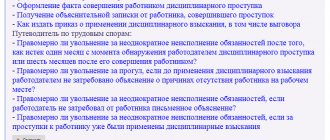What is a reprimand and what does it mean for an employee?
A reprimand is one of the most common types of disciplinary action (read the order on disciplinary action) and is the mildest punishment. Typically, the employer resorts to precisely this measure of influence when he wants to warn the employee about the inadmissibility of such violations in the future.
The remark does not have to be included in the employee’s personal file, but sometimes employers do so. In addition, the remark may be accompanied by such an action as the cancellation of bonus payments (if this type of incentive is provided for in the employee’s employment contract).
Severe reprimand: is there such a penalty now under the Labor Code of the Russian Federation?
No, such a disciplinary sanction does not exist according to the provisions of the current Labor Code of the Russian Federation. The employer could impose a penalty in the form of a severe reprimand until 02/01/2002, while the Labor Code of the Russian Federation, approved by the Supreme Court of the RSFSR on 12/09/1971, was in force (it provided for a severe reprimand as a possible penalty).
In practice, there are often cases when an employer decides to impose a disciplinary sanction in the form of a severe reprimand, guided by the internal local acts of the organization. Such actions are illegal and can be appealed in court.
However, if a provision for a severe reprimand is contained in a federal legal regulation, then this type of penalty can be applied. For example, it is used by the military, prosecutors, firefighters and other categories of government employees.
How long does a remark last?
After an employer has reprimanded his subordinate, the latter must keep in mind that for a year after that he will be under close supervision.
If during this period there are no repeated violations, then the remark will be automatically canceled and all the employee’s rights will be restored in full, but if something similar happens again, the offender may be punished more severely: with a reprimand or even dismissal.
It should be noted that the employer has the right to early cancel a disciplinary sanction previously applied to an employee. This is quite simple to do: you just need to issue the appropriate order to cancel the order and familiarize the responsible persons with it, as well as the employee himself. Typically, the reason for canceling a penalty is repentance, clear signs of correction by the employee, strict adherence to labor discipline and excellent work performance.
Order to impose a penalty: where to get a sample?
If the work carried out with the violator in the form of conversations and discussions did not have any effect, the employer has the right to reprimand the employee. This point will have to be documented. In order for a reprimand imposed in the form of a disciplinary sanction to have an official character and legal force, an appropriate order will have to be drawn up.
There is no officially approved form for such a document, so the employer draws it up taking into account the requirements accepted for any organizational and administrative papers.
The sample posted on our website in the material “Order on disciplinary action - sample and form” you formulate appropriate for the given situation .
Basis for the order
Absolutely any order drawn up on behalf of the company’s management must have a written basis. In most cases, this is
- a memorandum or memo from the head of the structural unit in which the offending employee works,
- as well as an act recording the offense and an explanatory note.
Without these papers, the document will not be considered justified and in which case it will be very easy to refute it; moreover, for the lack of a basis for writing the order, and therefore the penalty itself, the employer may be subject to administrative punishment.
Is it possible to cancel a foreclosure early?
Early removal of a disciplinary sanction is possible in the following cases:
- The employee himself should submit such a statement to the employer.
- The trade union will send such a petition to the employer.
- The initiative will come from the head of the department where the offending employee works.
- The employer himself will decide to cancel the penalty early.
But in any case, the decision remains with the employer, that is, he has the right not to satisfy such requests. Early withdrawal is issued by order on behalf of the manager.
Procedure for announcing a comment
Before reprimanding an employee, the employer is required by law to first record the violation itself (for this purpose, a special act details the essence of what happened, the date and time of the event), and then receive an explanation from the employee regarding the fact of the violation.
Explanations must be given in no more than two working days - if they are not there, it is considered that the employee does not have valid reasons to justify the offense committed.
If there are explanations, but the employer did not consider them weighty enough (and this opinion is confirmed by the law), this also serves as a basis for disciplinary action.
Next, an order is drawn up, which assigns a penalty in the form of a reprimand.
If the offender does not want to sign the document, a corresponding act should be drawn up about this.
The employee in respect of whom the order was issued must be familiarized with it within three days against signature, as well as those employees of the enterprise who are responsible for the implementation of this order.
The procedure for imposing a disciplinary sanction should be treated very carefully, because if the matter comes to proceedings in the labor inspectorate or court, the entire process and every piece of paper in it will be examined “under a microscope.”
Dismissal
The grounds for dismissal are given in Art. 81 of the Labor Code of the Russian Federation, here they are:
- An employee avoids fulfilling his job duties without good reason and more than once. At the same time, the employee has already been reprimanded or reprimanded, and they have not been withdrawn (clause 5 of Article 81 of the Labor Code of the Russian Federation).
- Violation of labor duties in a gross form (theft, absenteeism, violation of labor protection requirements, coming to work drunk (clause 6 of Article 81 of the Labor Code of the Russian Federation).
- For the chief accountant, director/deputy director - damage to the organization’s property due to an unreasonable decision or unlawful use of property (clause 9 of article 81 of the Labor Code of the Russian Federation).
- For an employee who is responsible for the company’s finances or commodity assets - committing such actions within the framework of his position, due to which management lost confidence in the employee (clause 7 of Article 81 of the Labor Code of the Russian Federation).
- For an employee with educational responsibilities - committing immoral actions within the framework of the position that are incompatible with work (clause 8 of Article 81 of the Labor Code of the Russian Federation).
- For an employee who did not take measures to prevent and resolve a conflict of interest in which he participated (clause 7.1 of Article 81 of the Labor Code of the Russian Federation).
Dismissal also applies to an employee who refuses to perform job duties after a change in the terms of the employment contract and labor standards at the enterprise. True, in this case, dismissal does not become a disciplinary sanction, and the parties terminate the employment contract under clause 7 of Part 1 of Art. 77 of the Labor Code of the Russian Federation, observing the procedure set out in Art. 74 Labor Code of the Russian Federation.
Rules for drawing up an order
Today there is no unified sample order for disciplinary action, so employers can write it in any form or according to a template developed within the enterprise. In this case, it is necessary that this document contain a number of certain information, including:
- name of company,
- Document Number,
- the date and place of its preparation,
- personal data about the offending employee (his position and full name).
The order must indicate the reason for its creation (i.e., indicate the essence of the complaint against the employee), the date of the offense, and also provide references to the basis. The latter are usually an act recording the violation and a report or official note from the head of the offender and an explanatory note (if any).
Can the law impose penalties and deprive bonuses at the same time?
According to Article 193 of the Labor Code of the Russian Federation, only 1 disciplinary sanction can be imposed for 1 disciplinary offense. In this regard, in practice, disputes often arise: can an employer, for example, issue a reprimand and deprive a person of a monthly bonus, because in fact the employee is punished twice.
In fact, it can, and this is in no way contrary to the law. The fact is that deprivation of a bonus is not a disciplinary sanction. A bonus is an incentive for an employee who copes with his job responsibilities (Article 191 of the Labor Code of the Russian Federation). Therefore, if an employee cannot cope with them, and even violates labor discipline, why should he be paid monetary incentives? Although there are nuances here too.
The employer has the right to deprive an employee of bonuses only when the cases in which this is possible are listed in local regulations (Regulations on remuneration or bonuses, collective agreement, etc.).
Rules for placing an order
The order can be drawn up in different versions: both in handwritten format and in printed form, both on a simple A4 sheet and on the company’s letterhead. However, he must have the original autograph of the director of the company or a person authorized to sign such papers. It is not necessary to endorse it using a seal, since it relates to the internal administrative documentation of the company; moreover, since 2016, legal entities are exempt from the need to certify their documentation using seals and stamps.
Consider another tactful question: when should you respond to comments made?
The following options can be offered:
before the remark is made;
immediately after the remark has been made;
later;
never.
Let's consider these options in more detail.
Before the remark is made. If you know that the interlocutor will sooner or later make a remark, then it is recommended to pay attention to it yourself and respond to it in advance, without waiting for the interlocutor’s reaction. In this case, you will have the following advantages:
absence of contradictions with the interlocutor and thereby reducing the risk of quarreling during the conversation;
the ability to choose the wording of your opponent’s comments and thereby reduce their semantic load;
the ability to choose the most appropriate moment to answer and thereby provide yourself with time to think about it;
strengthening trust between you and your interlocutor (since he will see that you are not going to fool him, but, on the contrary, clearly state all the arguments for and against).
Immediately after the remark was made. This is the most appropriate answer and should be used in all normal situations.
Later. If there is no desire to directly contradict the interlocutor, then it is better to postpone the response to his remark until a more convenient moment from a tactical and psychological point of view. It often happens that due to a delay, the need to respond to a remark may disappear altogether: the answer will arise on its own after a certain time.
Never. Hostile remarks, as well as remarks that constitute a significant hindrance, should be completely ignored if possible. Rejecting the interlocutor's comments and objections is always fraught with various kinds of conflicts, so in these cases maximum tact and delicacy is needed. There are rules of good manners that are applied when challenging objections and help solve emerging problems with the least psychological cost.
Let's look at these rules.
Disciplinary procedure
Step 1. We record the presence of certain circumstances that can subsequently be classified as an employee’s misconduct. This can be done by composing:
- a report or memo addressed to the general director;
- act;
- decisions of the commission (for example, based on the results of an investigation into the fact of causing damage to the employer).
Note that the act is the most optimal document, since the facts stated in it will be witnessed by several people (usually three).
If an employee goes to court over an imposed penalty, these are the people who can be witnesses on the employer’s part.
Here is a sample certificate of absence from work.
Step 2. We demand a written explanation from the employee by handing him a corresponding notice.
Further actions of the employer depend on the following:
(if) the employee has provided an explanatory note, the manager must decide whether the reason for the misconduct is valid. If the reason is not valid, is it necessary to punish the employee and (if so) what penalty to apply to him;
(if) the employee did not give any explanations, it is necessary to draw up a free-form act of failure to provide or refusal to provide explanations. And then decide on the issue of bringing the offender to justice.
The fact that the employee did not provide a written explanation for his misconduct does not prevent the employer from bringing him to disciplinary liability. And if, as a result of the misconduct, the employer suffers any material damage, then he will be subject to financial liability.
If the employee immediately refused to give any explanation for his misconduct, there is no need to rush to draw up an act of refusal and issue an order to impose a penalty right on the day the explanation is requested. It is better to wait the 2 working days allotted by law. This way you will deprive the employee of the chance to later claim in court that he was not given the opportunity to change his mind and give an explanation.
Although some courts do not see anything illegal in bringing an employee who refused to “explain” to disciplinary action right on the day when he was asked to explain.
Step 3. We draw up an order in any form to announce a reprimand or reprimand. It should briefly describe the offense (the so-called stating part of the order) and refer to all the papers drawn up in connection with this.
Please note that an entry about the announcement of a reprimand or reprimand is not made . But you can add it to your personal card to track whether the employee has disciplinary sanctions. After all, for example, in many companies, the presence of outstanding penalties against an employee is a reason for deprivation of a bonus.
(How to correctly apply these disciplinary sanctions to an employee)
Of course, it is necessary to influence negligent employees. In particular, with the help of disciplinary sanctions, of which there are only three:
- comment;
- rebuke;
- dismissal (in strictly prescribed cases by law).
other penalties and cannot be . There are no severe reprimands or reprimands entered into your personal file.
Attention! one can be applied for one disciplinary offense .
If an employee is subjected to a non-existent penalty and then fired for repeated misconduct, the court may declare the dismissal illegal only on the grounds that the originally imposed penalty is not provided for by the Labor Code.
And even more so, fines, demotion, postponement of vacation, and the like cannot be applied to employees as punishment. As for the deduction of a so-called disciplinary fine from an employee’s salary, if such a penalty is appealed, the employer will have to pay the employee all the money withheld along with interest for the delay in payment of wages.
If the labor inspectorate reveals that a penalty has been applied to an employee that is not specified in the Labor Code of the Russian Federation , the employer faces a fine:
– per company – 30,000 – 50,000 rubles;
– per manager – 1000 – 5000 rubles.
The order itself regarding such a penalty will be required to be cancelled. And if this is not done, the company and its directors may again be fined for failure to comply with a legal order of the regulatory authority.
For certain categories of workers, federal laws may provide for types of penalties that are not in the Labor Code.
For example , for civil servants this is a warning about incomplete compliance with the job. There are similar penalties for employees of the customs service and internal affairs bodies, and a severe reprimand may also be applied to them.
In this article we will look at the procedure for issuing penalties such as reprimands and reprimands. But first we want to remind you of this. The employer has the right to apply disciplinary sanctions if the employee fails to perform or improperly performs his duties. But these responsibilities must be documented - in an employment contract, job description or local regulation (for example, in internal labor regulations), and the employee must be familiarized with them against signature. In other words, the rule applies here: if the employer has not familiarized the employee with the document setting out his duties, then the employee is released from liability for failure to fulfill them.
Article 192 of the Labor Code of the Russian Federation. Article 193 of the Labor Code of the Russian Federation. Clause 5, Part 1, Art. 81 Labor Code of the Russian Federation. See, for example, the Cassation ruling of the Judicial Collegium for Civil Cases of the Orenburg Regional Court dated October 5, 2011 No. 33-6209/2011. See, for example, Determination of the Moscow City Court dated June 17, 2010 N 33-18087. Article 236 of the Labor Code of the Russian Federation. Part 1 art. 5.27 Code of Administrative Offenses of the Russian Federation. Part 1 art. 19.5 Code of Administrative Offenses of the Russian Federation. Clause 3, Part 1, Art. 57 of the Law of July 27, 2004 N 79-FZ. Article 29 of the Law of July 21, 1997 N 114-FZ; Part 1 Art. 50 of the Law of November 30, 2011 N 342-FZ. Article 68 of the Labor Code of the Russian Federation. See, for example, Determination of the Samara Regional Court dated July 30, 2012 N 33-6996.
An explanatory note as a procedure preceding a remark
The employee has the right to speak in his own defense. To do this, the employer takes written explanations from him. No more than 2 days are given to draw up an explanatory note. It explains why a violation of labor discipline occurred.
In some cases, the reasons turn out to be convincing enough for the employer to change his mind about issuing a punishment.
If an employee refuses to give an explanation about the misconduct, this also needs to be documented in the form of an act. For a document to be valid, it must be signed by at least 3 witnesses.







